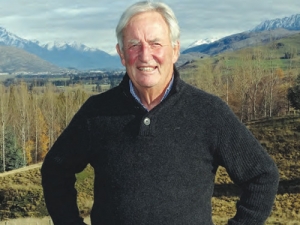Boutique cheesemaker Cranky Goat in voluntary liquidation
Award-winning boutique cheese company, Cranky Goat Ltd has gone into voluntary liquidation.
 Bob Berry, Whitestone Cheese, has been made a Member of the New Zealand Order of Merit (MNZM) for services to the cheese industry. Photo: David Williams, Otago Daily Times.
Bob Berry, Whitestone Cheese, has been made a Member of the New Zealand Order of Merit (MNZM) for services to the cheese industry. Photo: David Williams, Otago Daily Times.
The founder of Oamaru's Whitestone Cheese Company has been made a Member of the New Zealand Order of Merit in the Queen's Birthday honours.
Bob Berry calls the honour "truly a reflection on my wife Sue, son Simon and all our Whitestone Cheese team; they're the ones who made it all possible. It's very much a team effort."
Whitestone was founded in 1987 by the Berrys, then farming at Maheno, as a response to a farming downturn. They started in a garage but now operate in a factory in Oamaru employing 60 people and exporting to Australia, America and the Pacific. The company stays true to its artisan roots by selling through farmers' markets and the factory shop.
Simon Berry now runs the factory day-to-day while the elder Berry lives in semi-retirement at Lake Hayes, Central Otago, keeping his hand in as a director and assisting with marketing.
Bob Berry says Whitestone's niche is specialty cheeses. "We only produce high-quality premium cheese; we're not in the commodity market at all."
Even so, Whitestone produces at least 1 tonne of cheese a day, the bulk of it from cows milk, along with some goats milk cheese and a little from sheep.
The key to Whitestone's success has been local milk produced on "sweet" limestone country. Berry says it is vital, when producing a quality product, to start with quality raw materials. "It's the key to it. We wouldn't be here but for the quality of our milk."
In cheesemaking, as in wine, there are regional differences. "Pastures, climate, soil type, water: if you have all those basics right you're going to have good quality milk and you'll make good quality cheeses."
Whitestone receives most of its cows milk from a single farm in the Lower Waitaki region, via Fonterra under the DIRA (Dairy Industry Restructuring Act) regulations. The DIRA rules are now under review, but Berry says Whitestone is comfortable with the current arrangements.
The DIRA rules were set up to protect milk supply to niche manufacturers, at prices set at only a small premium above what Fonterra pays farmers.
"That levels the playing field," says Berry. "For small customers like us it's very important that we can source our milk at a reasonable price. When we first started there were probably three companies we could have gone to for milk. Of course all that disappeared when Fonterra was formed, so we can only really go to Fonterra."
Their goats milk comes from a Timaru supplier. Berry says the sheep milk suppliers have changed over the years -- especially as farms have converted to cows – but they currently source it from the Southland sheep milk specialist Blue River.
Voting has started for the renewal of DairyNZ's milksolids levy.
The most successful catchment groups in NZ are those that have 'a source to sea' approach.
Associate Agriculture Minister and Manawatu dairy farmer Andrew Hoggard says the free trade agreement (FTA) negotiated with India is not a bad deal and his party, Act, will support it when it goes before Parliament.
Newly released data from Environment Canterbury (ECan) Farm Environment Plan (FEP) audits are showing a dramatic lift in environmental performance across the region.
A solid recovery of global dairy prices this year makes a $9.50/kgMS milk price almost a shoo-in for this season.
As New Zealand marks the United Nations’ International Year of the Woman Farmer 2026 (IYWF 2026), industry leaders are challenging the misconception that women only support farming.